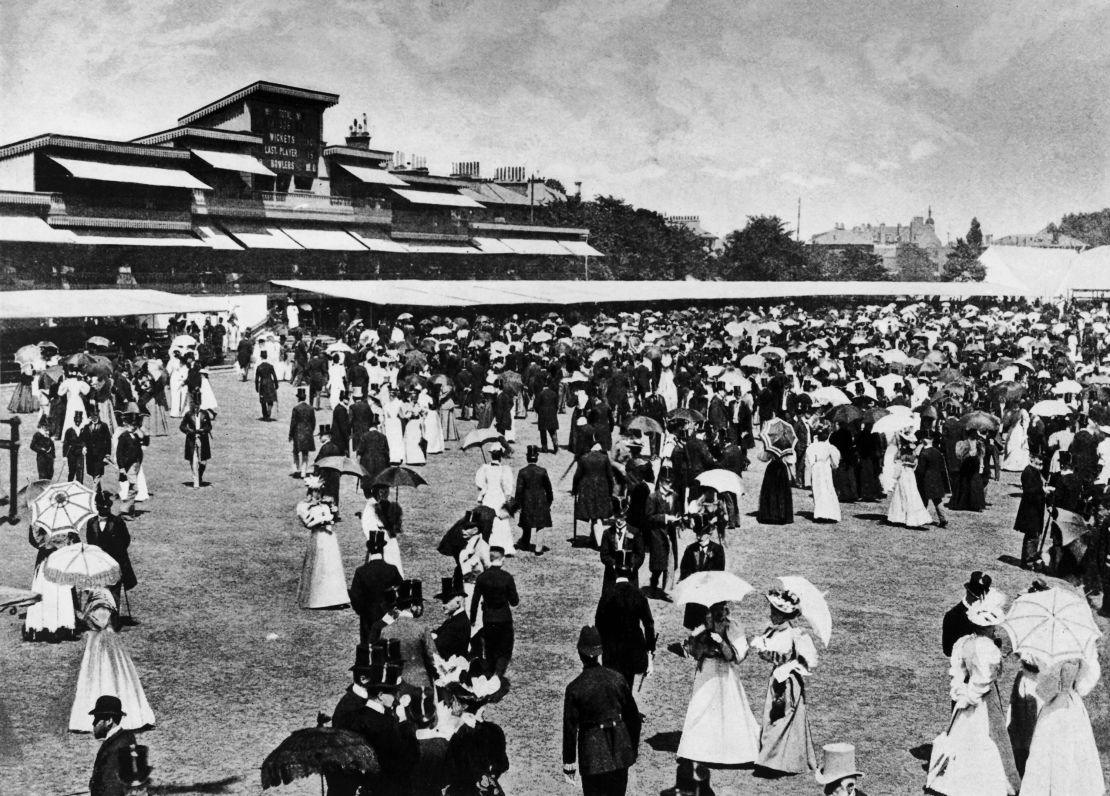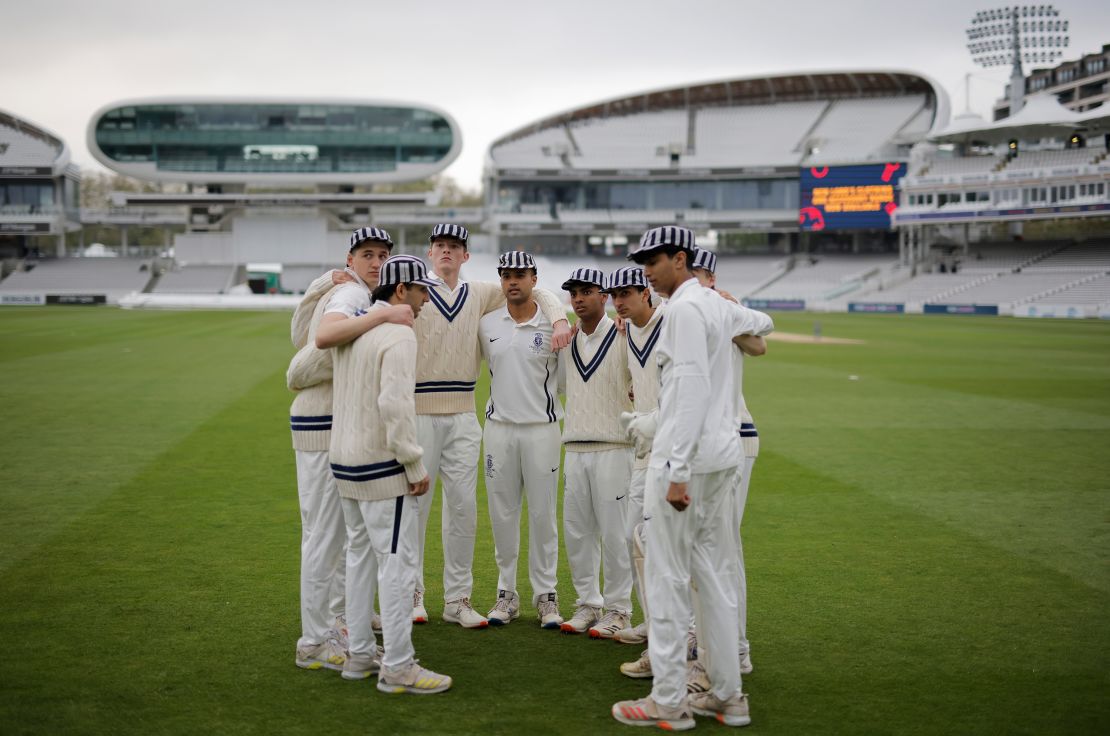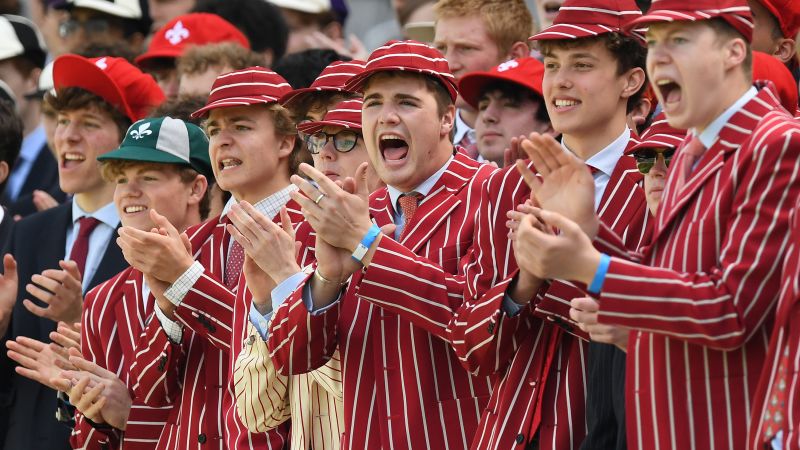Lord’s Cricket Ground, London
CNN
—
At Lord’s Cricket Ground in the quiet, well-heeled streets of northwest London, different architectural eras collide together in a mishmash of mismatching styles representing the old and the new.
A grand 134-year-old pavilion, its sandy brown stone façade covered in ornate embellishments, sits at one end, staring at a futuristic glass media center across the pitch which balances on white columns and peers like a giant oblong eye over the ground.
And never is that collision between the old and new more evident than when Lord’s, the self-styled “home” of cricket and one of its most prestigious grounds, hosts the annual schoolboys fixture Eton vs. Harrow.
The fixture – in which two of England’s most exclusive and expensive boys’ private schools play one another – is older than the oldest brick at this ground, first played in 1805 before Lord’s was even at its current location.
But it has become increasingly controversial and somewhat emblematic of the attempts of British institutions to reconcile their pasts with the present after it was axed from Lord’s schedule by the Marylebone Cricket Club (MCC), which owns the ground, in 2022.
That provoked an uproar from its members and the warring factions eventually reached a compromise in which Lord’s would host both the Eton vs. Harrow and Oxford vs.
Cambridge fixtures for another five years, as well as the finals of the UK’s school and university cricket competitions, before another consultation with members in 2027.
Eton and Harrow both said in separate statements to CNN that it was a “huge privilege” to play at Lord’s again this year and thanked the MCC.
For those criticizing the fixture, it is steeped in elitism and serves only to perpetuate stereotypes that cricket is an upper-class sport, one in which public schoolboys play annually on its most hallowed ground where the England Women have never played a Test.
“Guaranteeing a tiny number of schoolboys the right to play at Lord’s every year when millions of children are denied that right is completely unacceptable,” said the Independent Commission for Equity in Cricket in its 2023 report, which examined inequalities and discrimination within the English game.
However, for those attending Friday’s match – mostly relatives of the schoolboys on the pitch or alumni who have attended this fixture for decades – it is an important piece of history to preserve, a cherished tradition and another victim of “cancel culture.”
The Romantic poet Lord Byron played in the inaugural Eton vs. Harrow match more than two centuries ago. Afterwards, he wrote, “We were most of us very drunk and we went together to the Haymarket Theatre where we kicked up a row, as you may suppose when so many Harrovians and Etonians meet in one place.”
On Friday, cheers and chants began from the moment the two teams walked out onto the sun-drenched pitch.
“Let’s go, oi, oi, oi!” shouted the Etonians as they rose to their feet from the first ball, shouting, clapping, and even waving their shoes in their air, as is tradition. In another section of the stands, the Harrovians reciprocated with a standing ovation at the first boundary, before the Etonians launched into a rendition of the “Pirates of the Caribbean” theme song when a player called Jack Sparrow bowled his first over.
“The atmosphere today has been incredible; everyone has been really friendly. I’ve never known such a convivial atmosphere before,” Mark McCullen, who attended Eton and whose son is now at the school, told CNN Sport.
There is no qualification procedure for the fixture. Eton and Harrow play at Lord’s because they have played here for 219 years, because they are schools that are held aloft on their centuries-old history and which still churn out a disproportionate number of the British establishment. Twenty of the country’s 45 Prime Ministers, including two of its last five, went to Eton; another seven Prime Ministers went to Harrow.
It costs £49,998 ($62,620) per year to attend Eton, and £50,550 ($63,310) to attend Harrow, though both offer bursaries and scholarships for a small number of students.
For many spectators, this fixture is an intrinsic part of the schools’ respective histories, a tradition that remains from a time when debutantes making their entrance into upper-class society had to attend it, along with Wimbledon and the Ascot Races. Times may have changed but the tradition remains, making it almost sacrosanct for those who observe it and out-of-touch for those who don’t.
“I think it’s rather disappointing that there are a lot of people at the MCC who
think this fixture should be abolished because it’s elitist,” Harry Wells, an Old
Etonian who first came to this fixture 57 years ago and is this year supporting his
friend’s son in the Harrow squad, told CNN.
“I think our country is going to sell itself down the river if it abolishes everything
we’ve held dear over the millennia.”
As late as the 1960s, carriages would pull up outside the ground, depositing families there for one of the biggest events of the “season,” spectators who had watched those matches recalled. The crowds are smaller now, drawing in less money for the MCC, and around 2,000 to 3,000 people were expected to attend this year.
“It used to be a big social event … people in top hat and tails. It was quite part of the season as they used to say in those days,” Wells added.

“Everyone dresses down now, we’re not so formal in any form of society, though looking here, there are lots of people in jackets and ties.”
Despite the May sunshine, almost every man wandered around in their suits, the Eton boys wore their red striped blazers and matching hats, the Harrow boys their navy-blue blazers while women wore flowing dresses or blouses and many carried designer handbags.
“I don’t feel a sense of exclusivity at all,” one spectator told CNN, pointing to the £20 ($25) ticket available for people to come and watch.
“The boys work really hard to get here … You may as well get rid of history because it’s traditional and backward and imperialistic and whatever,” she added. “We have to learn from the past, and the successes of the past too.”
The question of the Eton vs. Harrow match has become entangled in the wider conversations around cricket presently. The sport – long associated with the English upper classes – has been buffeted by accusations of racism, sexism and elitism in the country where it originated while it has millions of fans around the world, considered more popular than any other global sport except soccer.
For actor, writer and comedian Stephen Fry, the Eton vs. Harrow match is indicative of an image that English cricket can’t quite shake off, what he described as “a turgid image of snobbery and elitism.”

“That’s not what cricket is about,” Fry, a former MCC president and longtime cricket fan, told the Times in October 2022. “It’s the second most popular sport in the world and it needs people to understand what a wonderful game it is, and how it’s available for everybody.”
In the end on Friday, Harrow coasted to victory by 91 runs, posting 321-5 before Eton could only respond with 230 all out. And there may not be too many more opportunities for Eton to retaliate.
“Times change. And the world is so far removed from that world now,” Mark Nicholas, the current MCC president, told the Telegraph in October.
“Common sense will prevail over the next four years within this compromise… I can see it moving on from here now very naturally.”












